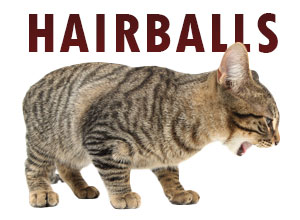Vomiting in cats is not a normal behavior. It has often been considered that it is normal for cats to vomit from time to time, or even regularly. This often leaves us with a sense of complacency about our cat’s vomiting. We excuse the behavior as “normal” or “normal because it is infrequent.” If your cat is vomiting in any amount, this should be regarded as a sign of a potential health issue and addressed with your cat’s veterinarian.
There are many reasons that cats of all ages can have a vomiting issue. We find excuses for the vomiting, in order to reduce the significance further. You may think that your cat vomits because she ate too fast, or because she ate grass, or the food did not agree with your cat. We may overlook the vomit when it contains hair because we assume that it is normal for cats to vomit hair. It is not.
Regardless of the apparent cause, vomiting is not normal and your veterinarian should assess the situation.
– Dr. Kelly St. Denis, MSc, DVM, DAVBP (Feline)
When is Vomiting an Emergency?
If your cat is experiencing sudden and severe bouts of vomiting, this is a medical emergency and you need to seek immediate veterinary care. Cats with sudden vomiting may have ingested toxins and/or foreign material. They may be severely ill with conditions like kidney disease, intestinal blockage, diabetes mellitus, and other serious medical disorders. Sudden, severe vomiting can progress rapidly (within hours) and no time should be lost seeking veterinary help.
Hairballs
Hairballs are not normal. All cats groom themselves; the normal result is that hair passes through into the feces. When hair builds up and doesn’t pass through, there may be a problem. It may be a result of excessive grooming (anxiety, skin disease or discomfort, parasites) or abnormal movement through the digestive tract. If your cat frequently vomits hairballs, there is an underlying problem and you need to make an appointment with your veterinarian immediately.
Chronic Issues Associated with Vomiting
Cats that are known to vomit on a regular basis are likely to also have a medical issue. You may think there is an acceptable reason for the vomit: “My cat just has a hairball;” “My cat started eating a new food;” “My cat is vomiting because he ate___;” “My cat just ate too fast.” Regardless of the apparent cause, vomiting is not normal and your veterinarian should assess the situation.
Your cat may be vomiting daily, weekly, or monthly due to a medical condition that is treatable, particularly if diagnosed early by your veterinarian. Diseases such as intestinal parasites, dietary sensitivities, and/or dietary imbalances may cause chronic vomiting. Metabolic diseases such as diabetes mellitus can lead to chronic vomiting as well. In a senior cat, chronic kidney disease, hyperthyroidism, and cancer are all potential causes of chronic vomiting.
Inflammatory bowel disease can also cause chronic vomiting. This disease occurs as a result of excess inflammation in the intestinal wall. The cause is not always known, but the disease can become very severe in some cases, particularly if not treated early. Some cats may actually have a form of cancer in their intestinal walls. This is called intestinal lymphoma and chronic vomiting is a symptom. All of these conditions can be treated, especially if diagnosed early. Some of them can even be cured.
What Should You Do if Your Cat is Vomiting?
- If you are feeling uncertain about the amount of vomiting your cat is experiencing, talk to your veterinarian.
- Start a calendar at home where you document every time your cat vomits. This will allow you to determine how often the vomiting is occurring. It will also allow you to assess the response to treatment once your veterinarian makes a diagnosis.
- While it is tempting to change food types in an effort to reduce the vomiting, this is not recommended. Although a food formulation change may (temporarily) decrease vomiting, the inevitable delay this will cause in determining a proper diagnosis could be life-threatening.
- Let your veterinarian assess your cat’s history, do a thorough physical examination, and perform the necessary diagnostic tests to find out how to stop your cat from vomiting.
Contributed by Dr. Kelly St. Denis, MSc, DVM, DABVP (Feline)


